B fat embolism - Study guides, Class notes & Summaries
Looking for the best study guides, study notes and summaries about B fat embolism? On this page you'll find 2977 study documents about B fat embolism.
Page 3 out of 2.977 results
Sort by
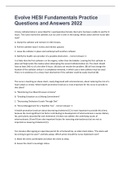
-
Evolve HESI Fundamentals Practice Questions and Answers 2022
- Exam (elaborations) • 27 pages • 2022
- Available in package deal
-
- $16.99
- 6x sold
- + learn more
Urinary catheterization is prescribed for a postoperative female client who has been unable to void for 8 hours. The nurse inserts the catheter, but no urine is seen in the tubing. Which action will the nurse take next? A. Clamp the catheter and recheck it in 60 minutes. B. Pull the catheter back 3 inches and redirect upward. C. Leave the catheter in place and reattempt with another catheter. D. Notify the health care provider of a possible obstruction. - Correct Answer: C It is likely th...
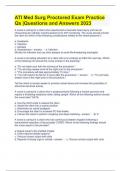
-
ATI Med Surg Proctored Exam Practice Qs |Questions and Answers 2023
- Exam (elaborations) • 19 pages • 2023
- Available in package deal
-
- $27.49
- 1x sold
- + learn more
ATI Med Surg Proctored Exam Practice Qs |Questions and Answers 2023 A nurse is caring for a client who experienced a traumatic head injury and has an intraventricular catheter (Ventriculostomy) for ICP monitoring. The nurse should monitor the client for which of the following complications related to the ventriculostomy?: a. Headache b. Infection c. Aphasia d. Hypertension b. Infection Monitor for infection and use strict asepsis to avoid life-threatening meningitis. A nurse is p...
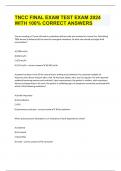
-
TNCC FINAL EXAM TEST EXAM 2024 WITH 100% CORRECT ANSWERS
- Exam (elaborations) • 15 pages • 2024
-
- $16.49
- + learn more
You are treating a 27-year old male in respiratory distress who was involved in a house fire. Calculating TBSA burned is deferred d/t the need for emergent intubation. At what rate should you begin fluid resuscitation? A) 1000 mL/hr B) 500 mL/hr C) 250 mL/hr D) 125 mL/hr - correct answer B) 500 mL/hr A patient has been in the ED for several hours waiting to be admitted. He sustained multiple rib fractures and a femur fracture after a fall. He has been awake, alert, and c/o leg pain. Hi...
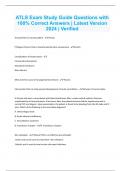
-
ATLS Exam Study Guide Questions with 100% Correct Answers | Latest Version 2024 | Verified
- Exam (elaborations) • 44 pages • 2024
- Available in package deal
-
- $14.49
- + learn more
Assessed first in trauma patient - Airway (*)Degree of burn that is characterized by bone involvement - Fourth Complications of head trauma - Intracerebral hematoma Extradural hematoma Brain abscess Most common cause of laryngotracheal stenosis - Trauma Intervention that can help prevent development of acute renal failure - Infusion of normal saline A 26-year-old male is resuscitated with blood transfusion after a motor vehicle collision that was complicated by a fractured pelvis. A fe...
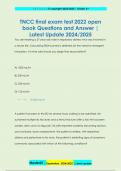
-
TNCC final exam test 2022 open book Questions and Answer | Latest Update 2024/202
- Exam (elaborations) • 28 pages • 2024
- Available in package deal
-
- $11.49
- + learn more
You are treating a 27-year old male in respiratory distress who was involved in a house fire. Calculating TBSA burned is deferred d/t the need for emergent intubation. At what rate should you begin fluid resuscitation? A) 1000 mL/hr B) 500 mL/hr C) 250 mL/hr D) 125 mL/hr ~~> B) 500 mL/hr A patient has been in the ED for several hours waiting to be admitted. He sustained multiple rib fractures and a femur fracture after a fall. He has been awake, alert, and c/o leg pain. His wi...
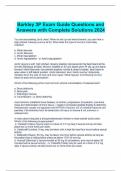
-
Barkley 3P Exam Guide Questions and Answers with Complete Solutions 2024
- Exam (elaborations) • 23 pages • 2024
- Available in package deal
-
- $15.49
- + learn more
You are auscultating Jon's chest. When he sits up and leans forward, you can hear a high pitched, blowing murmur at S2. What does this type of murmur most likely indicate? a. Mitral stenosis b. Aortic Stenosis c. Mitral regurgitation d. Aortic regurgitation - d. Aortic regurgitation Aortic regurg is soft, high pitched, blowing diastolic decrescendo that best heard at the 3rd left interspace at base. Murmur initiated w/ S2 and heard when Pt sits up and leans forward. Mitral Stenosis=...
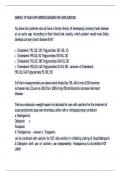
-
BARKELY 3P EXAM WITH VERIFIED ANSWERS WITH EXPLANATIONS
- Exam (elaborations) • 60 pages • 2024
- Available in package deal
-
- $21.49
- + learn more
BARKELY 3P EXAM WITH VERIFIED ANSWERS WITH EXPLANATIONS You have four patients who all have a family history of developing coronary heart disease at an early age. According to their blood test results, which patient would most likely develop coronary heart disease first? a. Cholesterol: 170; LDL: 120; Triglycerides: 120; HDL: 45 b. Cholesterol: 195; LDL: 110; Triglycerides: 135; HDL: 30 c. Cholesterol: 170; LDL: 100; Triglycerides: 140; HDL: 20 d. Cholesterol: 190; LDL: 140; Triglycerid...
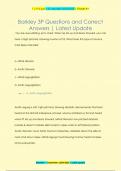
-
Barkley 3P Questions and Correct Answers | Latest Update
- Exam (elaborations) • 60 pages • 2024
- Available in package deal
-
- $13.79
- + learn more
You are auscultating Jon's chest. When he sits up and leans forward, you can hear a high pitched, blowing murmur at S2. What does this type of murmur most likely indicate? a. Mitral stenosis b. Aortic Stenosis c. Mitral regurgitation d. Aortic regurgitation → ~:- d. Aortic regurgitation Aortic regurg is soft, high pitched, blowing diastolic decrescendo that best heard at the 3rd left interspace at base. Murmur initiated w/ S2 and heard when Pt sits up and leans forward. Mitra...
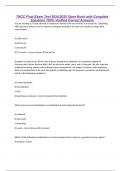
-
TNCC Final Exam Test 2024/2025 Open Book with Complete Solutions 100% Verified Correct Answers
- Exam (elaborations) • 15 pages • 2024
- Available in package deal
-
- $10.99
- + learn more
TNCC Final Exam Test 2024/2025 Open Book with Complete Solutions 100% Verified Correct Answers You are treating a 27-year old male in respiratory distress who was involved in a house fire. Calculating TBSA burned is deferred d/t the need for emergent intubation. At what rate should you begin fluid resuscitation? A) 1000 mL/hr B) 500 mL/hr C) 250 mL/hr D) 125 mL/hr - Correct Answer B) 500 mL/hr A patient has been in the ED for several hours waiting to be admitted. He sustained multiple...
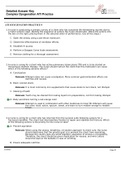
-
Detailed Answer Key Complex Oyxgenation ATI Practice
- Exam (elaborations) • 53 pages • 2022
-
- $14.99
- 3x sold
- + learn more
1. A nurse is conducting a primary survey of a client who has sustained life-threatening injuries due to a motor-vehicle crash. Identify the sequence of actions the nurse should take. (Move the actions into the box on the right, placing them in the selected order of performance. Use all the steps.) C. Open the airway using a jaw-thrust maneuver. D. Determine effectiveness of ventilator efforts. B. Establish IV access. A. Perform a Glasgow Coma Scale assessment. E. Remove clothing for a thor...

Study stress? For sellers on Stuvia, these are actually golden times. KA-CHING! Earn from your study resources too and start uploading now. Discover all about earning on Stuvia


